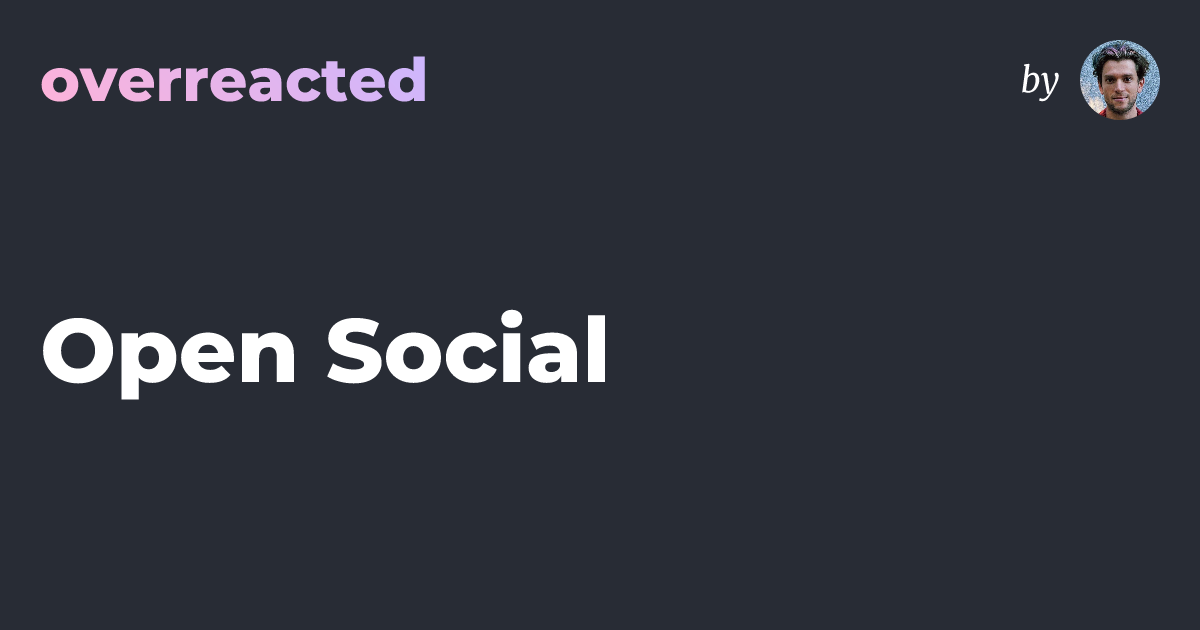AT Protocol, Identity, and Self-hosting

I spotted this on Hacker News, and it's a fantastic overview of how the AT Protocol is supposed to work and what problems it's trying to solve:

I do like some things about the AT Protocol, but I don't think the folks who designed it were trying to solve the correct problems.
Your domain is your identity
Let's start with my favorite thing about AT Protocol and Bluesky:
Notice that Alice’s handle is now@alice.com. It is not allocated by a social media company. Rather, her handle is the universal “internet handle”, i.e. a domain. Alice owns thealice.comdomain, so she can use it as a handle on any open social app. (On most open social apps, she goes by@alice.com, but for others she wants a distinct disconnected identity, so she owns another handle she’d rather not share.)
I really like this aspect of your domain as your open social handle, and the way it works on Bluesky is fantastic.
This, in part, seems to also be AT Protocol's answer to the multiple identity "problem" that comes up often with ActivityPub and the Fediverse. This is where you may have a Mastodon account, a Pixelfed account, and a WordPress or Ghost blog that all "speak" ActivityPub and can interact with each other but do exist as separate profiles at separate URLs.
While I like this about AT Protocol, I think at the moment the decentralized nature of the fediverse still provides more benefits for users (more on that later). Having multiple profiles or sites for different things does map cleanly to how the web has always worked. It's just like having multiple blogs, websites, or social media accounts, except these networks can interact with each other if you'd like them to.
Dealing with this complexity, in my opinion, is worthwhile, and learning your way through it is good!
Imagine not having to keep a Facebook account around just to follow a single family member's updates there. Or following that single Facebook profile from your blog or RSS reader instead. That would be awesome.
Keep in mind that you don't need to start out caring about any of this. In my perfect world, federated social media is the default thing and how all of this stuff already works. Most people should not have to know or care about the benefits of decentralization when they create their account, but it needs to be an option when it inevitably becomes important to them.
Benefits of ownership
Each open social app is like a CMS (content management system) for a subset of data that lives in its users’ repositories. In that sense, your personal repository serves a role akin to a Google account, a Dropbox folder, or a Git repository, with data from your different open social apps grouped under different “subfolders”.
[....]
In any user’s repo, Bluesky posts go with other Bluesky posts, Leaflet publications go with Leaflet publications, Tangled stars go with Tangled stars, and so on. Each data format is controlled and evolved by developers of the relevant application.
What I don't yet understand are the current benefits of hosting your own PDS. Don't get me wrong, I love self-hosting stuff. It's literally a hobby and my day job, but here's a somewhat ridiculous hypothetical which might make my point clear:
Imagine if YouTube worked exactly as it does right now, except for a few changes:
- Videos that play on youtube.com must be encoded into a new file type, ".yp4" files.
- Unfortunately, there are no other sites or applications that can read .yp4 files, nor are there tools to convert .yp4 back to other standard video formats. The only way to watch a .yp4 video is on youtube.com
- YouTube will not host .yp4 files, and you must store those videos on your own server so that folks around the world can watch them.
Technically, that would make one component of YouTube more decentralized than the way it works today, but have you gained anything? All access is still mediated and controlled by YouTube, but now you do also get to pay a hosting bill!
It's neat that with a self-hosted PDS your data technically lives on something you control and have access to, but if access to micro-blogging is completely reliant on access to https://bsky.app, then you haven't gained any meaningful ownership, just a technical liability. If I use BlueSky and host my PDS, can I still access it in Mississippi? [[1]]
This is why it’s important to me that federated things can be hosted by anybody. It matters that it’s possible for anyone to host Mastodon or Peertube instances, Ghost or WordPress blogs, or a whole number of tools that get to be peers on the Fediverse. That ecosystem doesn't exist for AT Protocol yet, and so far I haven't seen that development become a priority. Until there are alternatives out there, the decentralization of your data still has a single point of failure that you don't have control over.
I suspect the real answer here is "it is still too early for AT Protocol," which is fair, and "you don't understand it well enough," which is also fair. I hope it actually gets there, and its current level of decentralization is not viewed as "good enough."
[[1]]: Obviously I don't blame Bluesky for this law, but the fact that this situation could play out means you don't have much power here.

Comments